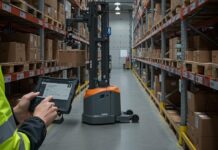
The podcast demonstrates how artificial intelligence has transformed supply chain management by providing real-time insights and predictive analysis that frequently outperform traditional logistics and supply chain methodologies. AI enables businesses to see through unanticipated demand and supply shocks and handle inventory more efficiently.
Listen to the Podcast:
Here are some key takeaways about how AI is revolutionizing supply chains:
-
Demand forecasting
AI can look at historical data and real-time data to forecast demand accurately. By being able to see when there are supply shocks or downturns, organizations can adjust their inventory levels to avoid stockouts and reduce their inventory levels to keep excessive inventory uptake and costs and improve responsiveness.
-
Inventory optimization
AI in supply chain management is capable of sourcing and comparing multiple data points and trends with statistically significant historical data to optimize inventory control for maximum replenishment. Organizations are able to avoid unnecessary shortages and spikes in product purchase whilst ensuring improved customer satisfaction and experience and ultimately creating much-needed operational efficiencies.
-
Transportation management
Transportation management systems that are AI-powered can take into account traffic data, weather data, fuel prices, and the availability of truck drivers to determine the best sequence of routes or service schedules to minimize delays, maximize load usage, and effectively eliminate downtime, which creates operational expenses that stakeholders unknowingly take issue with.
-
Security enhancements
AI enhances cargo security by analyzing large volumes of data to identify dangers. This further helps to detect odd activity and informs authorities swiftly. Also, this helps to establish safer shipment routes and automates reactions to theft instances.
-
Recruiting enhancements
In the trucking business, AI analyzes and evaluates driver performance and retention ratios to select individuals who can positively impact supply chain performance.
-
Healthcare supply chains
AI helps to enhance healthcare supply chains by anticipating demand, minimising waste, and preventing shortages. This helps the doctors and nurses to focus more on patient care instead of the logistics system.
-
Predictive analytics and risk management
AI in supply chain management can anticipate disruptions, uncover inefficiencies, and streamline procedures. This helps to reduce costs, decrease risks, and build stronger companies.
-
End-to-End visibility
AI in supply chain management improves visibility by anticipating disruptions like Chinese mine closures and offering alternative suppliers and logistics to ensure continuity.
Finally, this podcast reveals that AI in supply chain management is more than just a technology. It improves demand forecasting, security, hiring, and transportation. This enables the businesses to run more efficiently, responsively, and resilient supply chains.
Download Podcast:
You can download the podcast directly
Additional Resources:
For more details on AI in Supply Chain Management Transformation, check out the original article:
Artificial Intelligence – Altering Supply Chain Management by Supply Chain Informs.






























